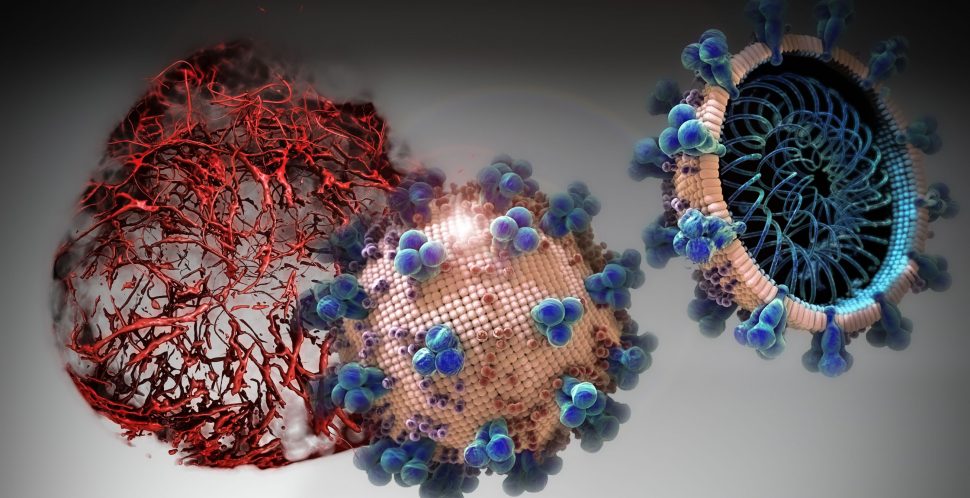Pictured above: Illustrations of engineered human blood vessels and kidneys grown from stem cells being treated with a trial drug.
Credit: IMBA – Tibor Kulcsar, courtesy of UBC.
And how insights into and victories against COVID-19 could prepare us for generations
In the short time since the government released hundreds of millions in funds dedicated to tackling COVID-19, research and development has progressed in leaps and bounds across public, academic and private sectors. We are witnessing the sheer agility that governments and funding bodies can achieve during crises. We are also experiencing firsthand the corresponding speed of innovation made possible by adequately resourced minds and institutions.
Although the various avenues of pandemic response in Canada are directly aimed at mitigating and treating COVID-19, it’s already clear that their impact will span years, and possibly generations.
Below are several examples of scientific breakthroughs being made in Vancouver-based institutions. Researchers and companies in BC’s robust life sciences sector are making notable strides in the work to help save lives, achievements that will undoubtedly aid national and global efforts to build long-term resilience in our healthcare and pandemic response systems.
AbCellera: Identifying life-saving antibodies
On March 23, Vancouver-based biotech firm AbCellera was named as one of the companies selected to share $192 million granted by the federal government. Specializing in industry-leading antibody discovery, AbCellera holds distinction as the first company in North America to receive blood samples from a patient who recovered from COVID-19. Within days of analyzing the sample, the team had identified 500 antibodies that could feasibly support treatments for the virus.
SFU: “Mango” Imaging Tech helps Visualize the Problem
Simon Fraser University (SFU) researchers are applying their Mango imaging technology – named for its vibrant colour – towards the development of coronavirus testing kits.
Leveraging funding from the Canadian Institutes of Health Research (CIHR), SFU researchers turned to Mango to single out pathogens that include coronavirus.
“The development of effective cures for cancer and other diseases demand better imaging methodologies to rapidly learn how cells work in detail,” says Peter Unrau, professor of molecular biology and biochemistry involved in the original Mango tech.
Researchers developed Mango to be sensitive to RNA molecules, and the latest research led by Unrau aims to apply this to individual molecules of RNA within living cells, which helps to improve screening for viruses. The system features an aptamer (a peptide molecule that attaches to a target molecule) that binds to a fluorescent dye, allowing scientists to more effectively see and study the RNA models.
“We are made of molecules, so when something goes wrong within a cell it happens at the molecular level,” explained Unrau. “We are using the Mango system as a catalyst, to allow us to not only extend fundamental research questions but also to detect pathogens like the coronavirus faster and more efficiently.”
CIHR’s funding will enable researchers to build on Mango by developing a new testing methodology they’ve dubbed “Mango NABSA” (nucleic acid sequence-based amplification). Mango NABSA kits can then be made available to test for coronavirus.
UBC: Rapid returns on government investment
In early March, four UBC Faculty of Medicine researchers received $2.4 million for solutions immediately tackling the COVID-19 outbreak. Last week, on March 24, UBC announced five more projects had received an additional $2.3 million, bringing the total to date in COVID-19-related funding to $4.7 million.
“We have a responsibility to take action and accelerate research that will not just save lives today, but improve our response to future outbreaks,” says Dr. Dermot Kelleher, Dean of the faculty of Medicine and Vice–President of Health at UBC.
The nine teams are working on a variety of measures to detect, manage and reduce transmission of COVID-19, including but not limited to:
- Developing and testing antibodies that neutralize and block the virus’s entry into cells
- Using artificial intelligence to identify compounds that could inhibit the main enzyme that allows SARS-CoV-2 – which causes COVID-19 – to survive
- Identifying proteins that are targeted by coronaviruses like SARS and MERS with the goal of blocking their ability to function, thereby inhibiting infection
- Providing clinical care and support to patients in isolation by redeveloping and deploying an app already in use
- Collaborating with other researchers across Canada to assess the transmission and socioeconomic impacts of COVID-19 in Canadian communities
Government funding will support UBC researchers’ work over the next two years, and any findings and data will be widely shared with the global community.
These investments are already bearing fruit: on April 2, an international team led by UBC researcher Dr. Josef Penninger and supported by Vancouver’s own STEMCELL Technologies thinks they’ve found a trial drug with promise as a treatment against early infection of the novel coronavirus.
Read more on how STEMCELL Technologies’ proprietary research is aiding global research on COVID-19.
Local manufacturers, businesses or institutions interested in helping Canada meet the need for medical supplies can refer to the below sites:
- Government of Canada call to manufacturers
- Province of British Columbia’s COVID-19 Supply Hub
- City of Vancouver’s Give a Hand Vancouver initiative
Refer to our COVID-19 resources page for up-to-date information and coverage.



